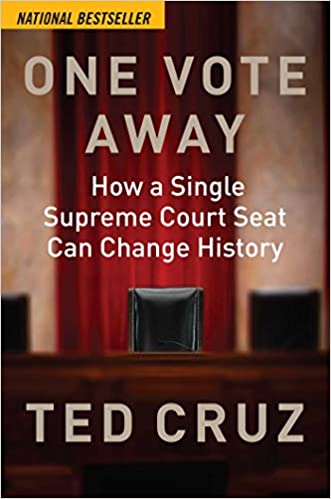 |
|
 |
|
 |
 |
 |
 |
 |
 |
 |
 |
 |
 |
| 2020 Election: | Joe Biden's book | Cory Booker's book | Pete Buttigieg's book | Kamala Harris' book | Bernie Sanders' book | Donald Trump's book | 2018 Senate Debates |
One Vote Away How a Single Supreme Court Seat Can Change History by Ted Cruz  (Click for Amazon book review)
BOOK REVIEW by OnTheIssues.org: Ted Cruz can hardly contain his excitement over the prospect of a rightwing majority on the Supreme Court in his 2020 book One Vote Away: How a Single Supreme Court Seat Can Change History. Written before the death of Justice Ruth Bader Ginsburg and the appointment of Amy Coney Barrett, the title makes his point for him. He proceeds to lay out a number of contentious issues where, from his perspective, the Court has the opportunity to either reverse past decisions, such as abortion rights, or continue further down the path he agrees with, such as overturning campaign finance laws. For those who would agree with him, he offers concise discussions about where the law has been and where he thinks it should be going. For those who disagree, it can serve as an examination of the conservative mindset, but it can also be infuriating because this is a polemic with no pretense at objectivity. Cruz is certainly upfront about where he's coming from. On gun control he writes, "Social stability and human flourishing require the right to bear arms…" [p.41] On education he declares, "I believe that school choice is the defining civil rights struggle of our time." [p.27] you can agree or disagree with such statements, but he is unequivocal in declaring how he's going to examine the issue. In other places, though, he can be misleading if not downright dishonest. His discussion of the Citizens United decision--which reversed decades of law in removing limits on corporate spending on political campaigns--distorts the debate by pretending that opposition to it turns on whether "corporations are people" or "money is speech." His chapter on crime offers his opinion that the exclusionary rule--that illegally obtained evidence is not admissible in a criminal trial--is "designed only to protect the guilty." [p.139] In fact, it is designed to deter law enforcement from illegally obtaining evidence by rendering it useless. Along the way Cruz offers some biographical notes from being smitten upon first meeting his wife-to-be to his reaction at being booed at the 2016 GOP convention after telling delegates to "vote your conscience" instead of unambiguously endorsing nominee Donald Trump. He reveals that he later turned down an offer to be on the Court because he didn't want to stay out of policy and political fights, "I want to lead them." [p.xx] He concludes by claiming that Republicans have been "absolutely terrible at judicial nominations" while Democrats "bat nearly 1.000." This would no doubt be news to Mitch McConnell who used the 2016 presidential election to refuse to even consider President Barack Obama's appointment of Merrick Garland and then, just weeks before the 2020 election, rushed through the Amy Coney Barrett nomination. Cruz's point is too many Republican judges refuse to adhere to what Cruz would call a strict constructionist view and his opponents would call a rightwing agenda. The politicized fight over judicial appointments shows no sign of letting up. Cruz's book succeeds in making the case from his side of the aisle. -- Daniel M. Kimmel, editor, OnTheIssues.org, June 2021
How a Single Supreme Court Seat Can Change History by Ted Cruz. Error processing SSI file
| |||||||||||||||||||||||||||||||||||||||||
| |||||||||||||||||||||||||||||||||||||||||
Page last edited: Nov 25, 2021